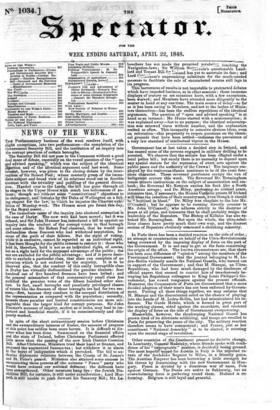NEWS OF THE WEEK.
TUB Parliamentary business of the week resolves itself, with slight exceptions, into two performances—the completion of the Government Security Bill, and the institution of an inquiry into the corrupt practices of certain boroughs. The Security Bill did not pass in the Commons without a good deal more of debate, especially on the vexed question of the "open And advised speaking,' which was the subject of the identical oltection and of the identical argument used last week. Some interest, however, was given to the closing debate by the inter- vention of Sir Robert Peel ; whose masterly grasp of the imme- diate subject and broad view of its relations stood out in forcible contrast with the triviality and peddling of the general discus- sion. Handed over to the Lords, the bill has gone through all its stages in the Upper House with much less tediousness of pa- laver ; though not ivithout some " constitutional " objections to its stringency, and .'ensarks by the Duke of Wellington on a fail- ing respect for the law, to N. hich be imputes the Chartist exhi- bition of Monday week. The Houses meet pro form& this day, for the Royal assent. ,
The immediate cause of the inquiry, into electoral corruption is the case of Derby. The new writ had been moved ; but it was refused, and Sir Sohn Hanmer has introduced a bill to appoint an inquiry into the conduct of the corrupt voters in that borough and some others.. Sir Robert Peel observed, that he would not disfranchise those freemen who had withstood temptation, be- cause of the guilt of their fellows. But the right of voting, while it is exclusive, cannot be regarded as an individual right. It has been thought for the public interest to restrict it : those who hold it, therefore, hold it not as an individual right, of course, but as a right held for the supposed advantage of the public ; the rest are excluded for the public advantage ; and if it prove desir- able to exclude a particular class, that class can complain of no i privation which is not endured by the majority. It is to be observed also, that the conduct of this easily corruptible class in Derby has virtually disfranchised the genuine electors: four hundred out of five hundred freemen have been bribed ; and the general misconduct of that comparatively small class has nullified the genuine votes of the fifteen hundred other elec- tors. In fact, small boroughs and peculiarly privileged classes of voters like the freemen of those boroughs are bad for two rea- sons,—first, because they conduce to the unequal distribution of the representation as compared with the population ; secondly, because those peculiar and limited constituencies are more ma- nageable than the larger kind for corrupt purposes. Sir John Hanmer's measure of inquiry, modest as it looks, may lead to im- portant and beneficial results, if it be conscientiously and dili- gently worked.


























